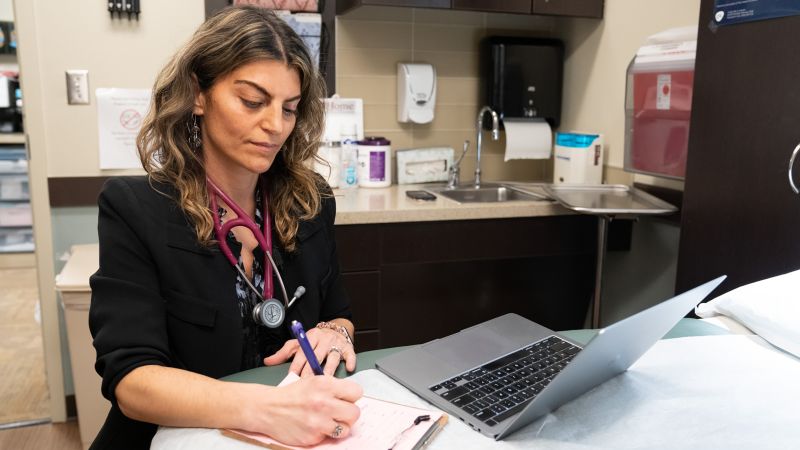In Gaines County, an expansive region located in the western part of Texas, a significant public health crisis is unfolding. The area, characterized by its vast, flat landscapes that stretch over 1,500 square miles and are largely dedicated to agriculture, is currently experiencing a measles outbreak not witnessed in the state for over three decades. At the heart of this outbreak is the Mennonite community, a tightly-knit group of Anabaptists who primarily inhabit this rural landscape. According to health professionals, the uneven vaccination rates within this community are a concerning factor contributing to the rapid spread of the highly infectious measles virus.
Dr. Leila Myrick, a physician actively engaged in combatting this outbreak, noted that the majority of the unvaccinated population resides within the Mennonite community. Despite her observations, she stresses that the issue does not solely pertain to this group. A staggering 159 cases of measles have been reported across nine counties in West Texas. Various factors, including a significant portion of the local population expressing vaccine skepticism, contribute to this troubling scenario. Furthermore, Texas law permits parents to opt out of vaccinating their children for non-medical reasons, further complicating the public health response.
Historically, many members of the Mennonite community immigrated from Mexico in the 1970s and had to comply with vaccination requirements upon becoming U.S. citizens. However, Tina Siemens, who runs a museum documenting the Mennonite legacy, highlights a shifting trend among younger generations who opt out of vaccinations for their children. Siemens clarified that their reluctance towards vaccination is not driven by religious convictions but rather reflects a cultural inclination towards self-sufficiency. Traditionally, Mennonites have relied on home remedies instead of seeking medical assistance for every ailment, a practice that might shape their current attitudes towards vaccinations.
To facilitate communication within the Mennonite community regarding vaccination opportunities, Siemens has been translating health department promotional materials into German. Despite her efforts, there appears to be a disconnect in outreach, as many resistant families remain unreceptive to these health initiatives. Siemens expressed concern over the negative perceptions being directed toward her community, especially following the tragic death of a young girl, also from the Mennonite community, attributed to the measles outbreak.
The broader vaccination landscape in Gaines County indicates that skepticism regarding vaccines is not confined to the Mennonite population. Public schools in the area have reported that more than 17% of students have chosen to remain unvaccinated, embracing “conscientious exemptions.” This rate is among the highest across Texas, a state that allows vaccine exemptions based on personal beliefs, not limited to medical or religious grounds. Dr. Myrick emphasized that a declining vaccination rate sets the stage for outbreaks, highlighting the challenges faced in achieving herd immunity against infectious diseases like measles.
Fortunately, free vaccinations are accessible in Seminole, the county seat, seven days a week. Local actions to promote vaccination are being undertaken; for instance, Dave Fisher, a local radio station news director, actively advocates for vaccinations on air. Fisher recognizes a minority of skeptics in the English-speaking population and relates this skepticism to broader distrust in governmental agencies, particularly stemming from the COVID-19 pandemic. Parents have expressed fears that vaccines may pose more risks than the diseases they prevent, citing their research as the basis for their decisions.
When questioned about their reluctance to vaccinate, many individuals cite varying influences, ranging from personal familial experiences to misconceptions fueled by misinformation on the internet. Meanwhile, the small-town atmosphere of Seminole, with its long, main street and multi-lingual interactions, might inadvertently facilitate the virus’s spread among vaccinated and unvaccinated populations alike.
As the outbreak continues, there are indications that some vaccine skeptics may be reconsidering their stance. Reports of families encouraging vaccinations within the Mennonite community offer a glimmer of hope amidst the crisis. Siemens expressed optimism about the importance of vaccine choice, celebrating the freedom such health decisions represent in America. The evolving dynamics of this outbreak serve as a critical reminder of the complexities surrounding vaccination, personal belief systems, and community health. CNN correspondent Ashley Killough contributed insights that illuminate the intricacies of this public health challenge, suggesting that collective efforts will be essential in overcoming it.












